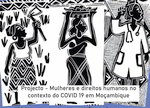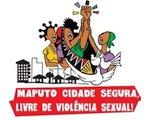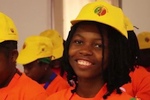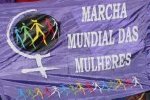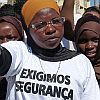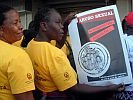The Family Law, Activists and Women’s Citizenship
Maria José Arthur
At this moment, an important part of the process to give Mozambique a new Family Law has come to conclusion. This process, which led to elaboration of the Bill now in the Parliament, was guided by the Ministry of Justice and involved various sectors of society, amongst them women’s organisations. Recognising the importance for improving women’s lives of a just family law that respects gender equity, these organisations involved themselves at different levels. They mobilised to establish consensus on their principal demands, they participated in meetings and seminars held by the Ministry’s Commission for Law Reform, and organised debates in the provinces with the aim of informing and gathering the opinions of women throughout the country. Leaflets and posters were produced, seminars were organised at universities to debate research results, and workshops were held to share experience with other countries on the same issue.
However, the interests of these women’s organisations came into conflict with those of certain other sectors of civil society, especially some religious organisations and certain representatives of traditional authority. In this confrontation, that was publicly expressed and documented in the press, positions became ever more extreme, finally resulting in an effort to disqualify the women’s rights activists. The mechanism is well-known: when, in a debate, there are few arguments to defend a certain idea or point of view, its proponents turn to personal attack on those who hold the opposite position. It is nothing new that acts in defence of women’s human rights are ridiculed or disqualified. As Soihet argues (2201: 99), ‘female behaviour that demands fuller participation in society is seen as a threat to the existing order, constituted according to male interests, in which men are afraid of losing their predominant position in gender relations of power’.
This article seeks to discuss how this confrontation developed, opposing women’s organisations to certain other sectors of civil society during the almost three-year period in which this process went on, from 1998 to 2000. The possibility of acting in defence of women’s human rights is revealing of democratic practice and the way in which women’s citizenship is perceived.
The positions and demands in relation to the Family Law
In 1998, the Sub-commission for Revision of the Family Law of the Ministry of Justice began to organise meetings and seminars with the aim of creating space for discussion so that women’s organisations, religious organisations and various other segments of civil society could express their expectations in relation to the law. In these debates, it became clear that women’s organisations needed to intervene more actively to defend women’s human rights, because they felt there was pressure to maintain the most discriminatory aspects of the existing law, as well as to include other discriminating aspects. One example is the proposal to make polygamy official.
With regard to women’s organisations, the major role was played by activist members of those organisations based in the capital, where official consultations most frequently took place. The main demands of the women’s organisations were:
- In relation to the definition of ‘marriage’ – the law should not treat marriage as a union with reproductive aims, which has implications for the respective rights of men and women;
- Autonomy of both spouses in the administration of property;
- Representation of the family – elimination of the figure of ‘head of family’, to end the regime of marital power exercised by men;
- Marital age – the minimum age should be the same for men and women. The age difference in the present law is based on discriminatory assumptions about women: I) to marry, a woman only needs physical maturity; ii) marriage is a union with reproductive aims; iii) the man has to be holder to be the head of the family, age meaning in this case maturity.
- Recognition of de facto unions in relation to: paternity, exercise of paternal power, inheritance and the right to sharing of property, including the possibility of expanding this measure to include the recognition of de facto union for the purposes of social assistance and taxation;
- Recognition of polygamous relationships in relation to: protection of children, right to inherit and the division of joint property;
- Recognition of other forms of marriage, such as religious and traditional, as long as these fulfil the requirements of the law;
- The exclusion of articles that legalise rape within the conjugal relationship (this is still not the criminalisation of rape, to be included in the reform of the Penal Code).
The militants of these organisations declared that they were basing their demands on legal grounds, on the promises made to Mozambican women and on the need to have a law that educates and serves as a model and that would not become out of date within the next 20 or 30 years.
The other interest parties, that defended contrasting positions, demanded:
- The recognition of polygamous relationships, with the argument that this is a common practice in Mozambique and that the Muslim religion recognises the right to have up to three wives;
- That the marital age for women should be lower, because women are ready for marriage earlier than men; ‘because women are natural homemakers’, ‘because men need more time to play around and then settle down to marriage’;
- That only men can be heads of families, as defined by tradition and in religious rules;
- The non-recognition of de facto unions, a practice considered to reveal the immorality of current times and which should be contested.
To sustain their arguments, they refer to the respect of religious beliefs (although Mozambique is a lay state), the respect of African culture and the need for a law that reflects social reality.
In the face of this confrontation and the need to expand the debate, women’s organisations developed different activities, such as taking the debate to the provinces, organising meetings and seminars at the university and amongst activists, producing informative material and newspaper articles, petitioning in support of equal rights in the Family Law, amongst other public events.
For their part, between 1999 and 2000, other sectors of the civil society submitted regular paid articles in the national newspapers and organised round table discussions on public television.
The discussion of the different versions of the Bill
The next step was taken when, in April 2000, the Sub-commission presented the Bill for the Family Law, in a seminar gathering representatives from different sectors of society. In this version of the Bill, the following features may be highlighted: the recognition of religious and traditional marriage as forms of constituting a family; an expanded definition of grounds for divorce, including domestic violence; the substitution of paternal power by parental power; adoption, guardianship and foster family. From the point of view of women’s human rights, the proposal was a direct response to CEDAW, and there was an immediate acceptance of it by the women’s organisations present at the seminar. However, the reaction of other participants showed the same reservations that had been revealed before. There was much discussion about some of the articles, especially those that aim to ensure equality between men and women.
Just as before, reaction against the new contents of the Bill were justified mainly on grounds of the right to preserve cultural and religious traditions. It should be underlined that these arguments are not new, neither in the national, nor in the international context. It is the problem of compatibility between the collective rights, which are being reclaimed again, and equality of rights between individual members of the community. Women are usually the first to lose out through compliance with collective rights, because their rights can be refused. The CEDAW Convention requires that governments eliminate all forms of discrimination against women, which includes those that can be justified by tradition or community preference. This inevitably imposes on governments the task to establish a strict and artful balance between the mutually conflicting human rights.
From this moment on, the conflicts became more overt. Insults were exchanged and lobbies were made by both parties, and negative images were starting to be drawn about the women’s organisations’ activists, with the aim to disqualify their action: ‘the new proposal was designed by urban, divorced women, who hate men’. In concrete terms, this was to question their representativity (‘How can you speak on behalf of all women, when you don’t know the life of women in the countryside?’), as well as their ‘normality’. In one way or another, this meant to say that these women don’t correspond to any female model that is socially acceptable – women without men, women out of control.
In relation to this aspect of ‘legitimacy’, one should remember that in Mozambique, as in certain other Southern African countries, due to their recent history, women’s citizenship is conceived, first and foremost, as a ‘citizenship by merit’: women participated in the armed struggle, they showed they could engage in the anti-colonial struggle, and therefore deserve some rights. This conception ends up justifying any future demand for rights: it has to be proved, not only that you merit, but also that you’ll make ‘good use’ of these rights, because according to the dominant ideology, the process of women’s liberation must advance in time with their ‘conscientisation’. Never mind that these women’s movements fight for equality for all, their activists are asked to prove their representativity: what proves that all women really agree with you? In this argument, diversity between women is invoked, but, for official policies, reference is implicitly made to the category ‘woman’, as a single, homogeneous category, based on an essentialist conception about the unchangeable, female nature.
When the Bill was finally submitted to the Council of Ministers, in mid-2001, it was returned with the recommendation that public consultations should be continued, because it was the Ministers’ impression that the proposal didn’t respond to the varied expectations of society. In response to this recommendation, in June 2001, a historical two-day seminar was organised in which women activists invited were a minority, while the rest of the invitees included representatives of other organisations that had already participated in the debates, as well as six people selected specifically from the neighbouring rural areas, with the sole criterion for their presence being the fact that they were polygamists, i.e., they were men with more than one wife.
On this occasion, no new arguments were presented, but it was worth noting the habitual tone of debate, clearly undermining the dignity of and respect for Mozambican women. The above-mentioned polygamous participants, to whom great space was given in their quality as representatives and defenders of this form of marriage, defended the continuity and the inclusion in the law of polygamous unions, through the following arguments: “Women work a lot. They get up early, heat the water for the husband and prepare the breakfast. Then they take care of the children and go to the fields. They clean the house, wash the clothes, and prepare meals. In the evening, they still have to take care of two babies, the child and the husband, who also needs attention. If there are other wives, the woman can ‘rest’ from the husband.” When this persons talks about ‘taking care’ of the husband, he is obviously talking about sexual services, for which the woman’s consent is not needed. As one can see, according to this statement and interpretation of the customary norms, that are presented as hegemonic, all sexual practice within marriage is potentially coercive, as no female consent is needed.
At the end of July, the Bill returned to the Council of Ministers, was approved and further sent to the Parliament, with emphasis on the need to respect the spirit of the Constitution and of the international conventions ratified by the Mozambican Government.
Activism, citizenship and democratic practice
What can be concluded and learned from the process of debate and elaboration of the new Family Law? One aspect, in particular, calls attention for us, activists for women’s human rights, engaged in influencing the revision of discriminatory laws and the way they are applied and to achieve a change of policies. It is the question of the pressure put on us socially and individually in the exercise of our activity. While the general environment seems favourable, if one is to believe what is explicitly stated in government policies, in the programmes of political parties and in the agendas of the international development agencies, it is in moments of confrontation, when male privilege is really at stake, that positions become extreme. In reality, what has happened is that, in the last few years, in spite of the national Constitution and the ratified international conventions, there has not been enough effort to allow for effective equality between men and women before the law or to promote women’s access to material and social goods.
Looking at the situation in Southern Africa, we can state that it is not very different, even in the SADC countries, where their respective Constitutions have established equality between men and women and where all countries, except for Swaziland, have signed the CEDAW.
There are references to systematic disqualification of women’s human rights activists, that takes the form of publicising negative images of the activists, with the aim of reducing their credibility and legitimacy (Kweba, 2000). Furthermore, the negative connotation of the term ‘feminist’ is maintained, as a legacy from the times of anti-colonial and anti-imperialist struggle, when feminism was associated with petty bourgeois radicalism and with the defence of libertine habits. It is strange that still today, when NEPAD triumphs and is imposed as a strategy of integration in the globalisation process, the idea persists that feminism can be equated with radicalism and the West and with such negative connotations. There is a persistent fear of ‘foreign’ influence, as if only capital could be globalised, while social movements are asked to keep their activities and their networks within national boundaries.
There is also the constant demand for ‘legitimacy’ of the activists (in contrast to politicians and other male leaders, of whom this is not requested), combined with a limited participation in the formal political fora, such as the Parliament. The percentage of women in the different Parliaments in the region vary from 7,3% in Swaziland to 29,8% in South Africa, just to mention a few (Kethusegile & al., 2002:56). In addition, there is the fact that, in most cases, female Members of Parliament, alien to the party political logic, play, above all, the role of legitimising established power (Osório, 2002). In contrast, the participation of women is more visible in NGOs, which has led to the idea that these might become an alternative power base for women (Lobby News, Lusaka, 1998).
Indeed, an analysis of African women’s public participation in the last few decades shows how the patriarchal model interferes in their access to that which is expressed as a right in the Constitutions of the different countries (McFadden, 1995; Kethusegile & al., 2002). In other words, the patriarchal nature of many African states, in combination with male prejudice in political institutions and practice, limits women’s opportunity to benefit from their rights and from access to political power and to resources (Randriamaro, 2002).
The analysis of various examples from Southern Africa reveals that the influence of the patriarchal cultural model orients, limits and defines the nature of access and control of resources by women, and continues to be determining in the violation of women’s rights (Angula, 2000; Kethusegile & al., 2000:37). By deconstructing the socialisation mechanisms of the African family in Zimbabwe, another study shows how the symbolic aspects of domination that effectively legitimise women’s subordination, are also responsible for the formation of a public image, oriented by the androcratic model, that maintains the complementarity of the male as an identifying element of the female (McFadden, 1995).
Finally, what we are talking about is citizenship. We are talking about rights, that is, the right to education, health and employment, and about the functioning of the political organisation and of the judicial system, as the guarantee of what are now called, in modern democracies, fundamental rights. We reiterate the importance of ensuring, not only the co-existence of different expressions of thought, but also the possibility of social control of the limitations imposed, in the name of the nation or of political stability, to these fundamental freedoms. This means that the existence of human rights is put in question each time that institutions do not structure themselves around democratic principles and whenever normative principles do not exist that would allow for citizen to exercise democracy.
References:
ANGULA, Nahas (2000). – Gender: Unequal sexes and the gender challenge in Namibia.
KETHUSEGILE, Bookie et al. (2002).- Para além das desigualdades. A mulher na África Austral.- Maputo: SARDC.
KWEBA, Daudi (2000).- Gender equality and democratic governance.
MALABA, Joyce (2000). – The gender dimensions of Human Development, SADC.
McFADDEN, Patricia (1995). – Challenges and prospects for the African women’s movement into the 21st century. – Harare: Feminist Studies Center.
OSÓRIO, Conceição (2002).- Poder político e protagonismo feminino em Moçambique.- In: B. S. Santos (org.), Democratizar a democracia. Os caminhos da democracia participativa.- Rio de Janeiro: Civilização Brasileira.- pp. 419-51
RANDRIAMARO, Zo (2002).- NEPAD, Gender and the Poverty Trap: The challenges of financing for development in Africa from a gender perspective.- (http://www.africafiles.org/article.asp?ID=921 – accessed 31 March 2011)
SOIHET, Rachel (2001).- “Sutileza, ironia e zombaria: instrumentos no descrédito das lutas das mulheres pela emancipação”.- In: R.M. Muraro e A.B. Puppin (orgs.), Mulher, gênero e sociedade.- Rio de Janeiro: RELUME-DUMARÁ.- pp. 99-111.







 Information in English
Information in English